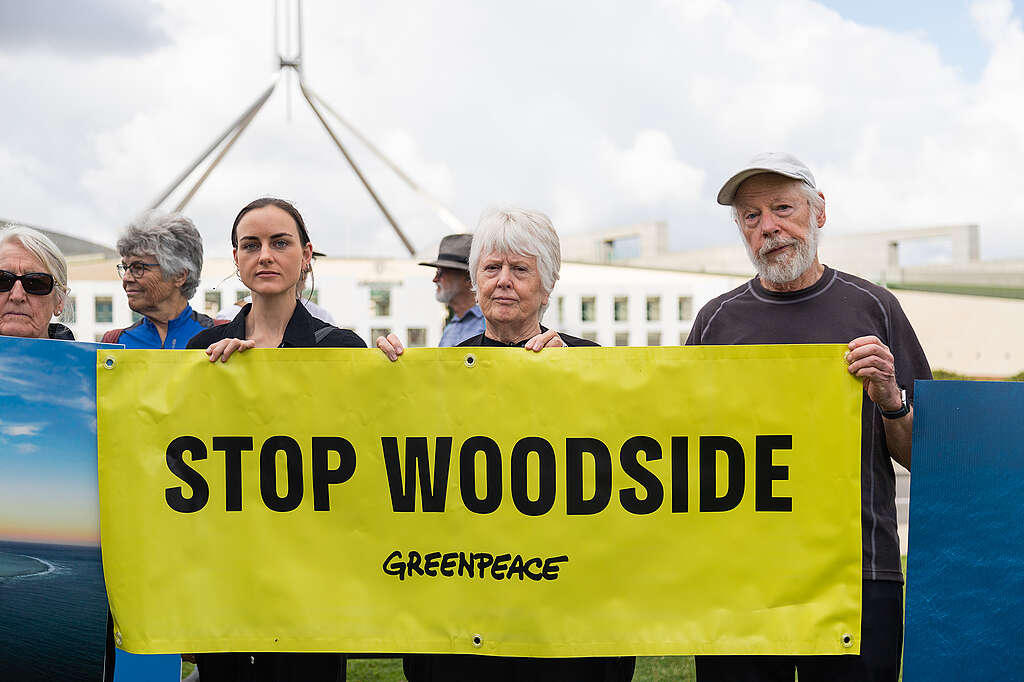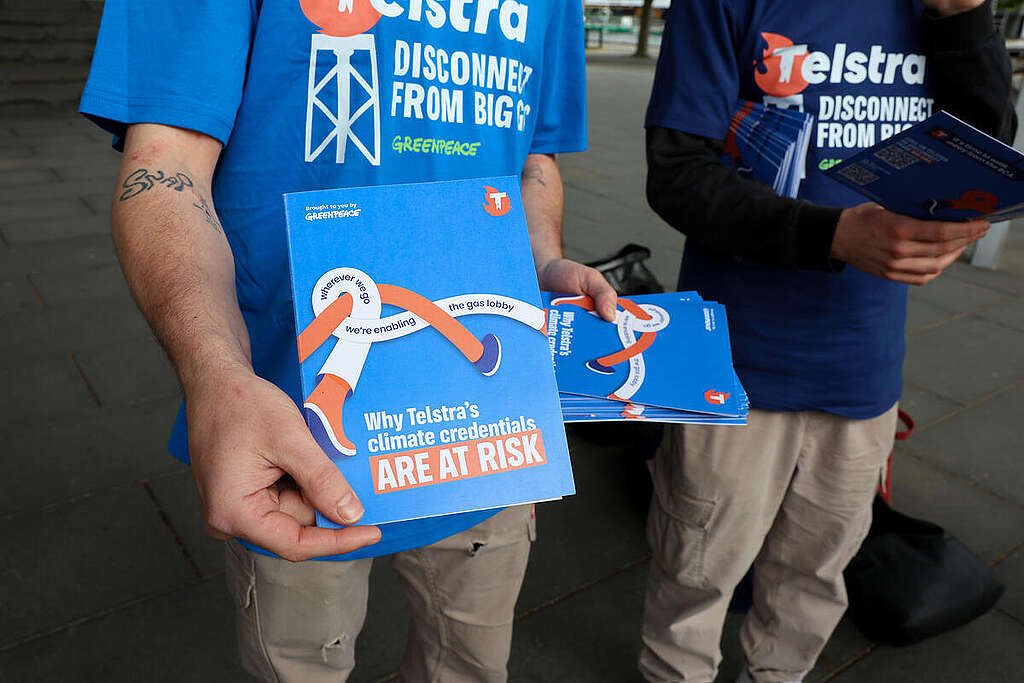Lately I’ve been speaking with a lot of big companies and universities as part of Greenpeace’s gas campaign.
We’re urging brands like Telstra, Bupa, Woolworths, UTS, NAB and more to cancel their membership of the Business Council of Australia (BCA) – a powerful lobby group that’s been advocating for more dirty gas projects on their behalf.
Greenpeace is focused on these brands because they all claim to care about climate action and have made strong individual commitments to decarbonise their businesses. As a company committed to reducing emissions, you’d think that fossil fuel lobbying is counterproductive to those efforts – right?
These companies don’t think so. What I hear in meeting after meeting is a version of “that’s not my problem.”
But fossil fuel lobbying is their problem – and not just because it destroys their credibility on climate. Direct or indirect lobbying can bring legal, investor, reputational, and governance risk that companies need to be taking seriously.
Why indirect lobbying matters: the political influence of Industry Associations
Direct lobbying is when a corporation goes directly to the government, or whoever they are trying to influence and pushes their views. Indirect lobbying is when a corporation pays to be part of an Industry Association (also known as a peak body) which will do that lobbying on its behalf.
For a company, indirect lobbying via an Industry Association is often more influential than their own direct lobbying. Industry Associations like the BCA and Australian Energy Producers (AEP) have a big impact on shaping policy, through directly lobbying the government, being active in the media and advertising, and making political donations. Indeed this influence is the key reason why companies choose to become members in the first place – because they recognise that by presenting as a united voice, they can get more done than lobbying as one company.
When the BCA or AEP speak – the government listens. Prime Minister Albanese gave the keynote address at the BCA’s annual gala dinner earlier this year. And these groups are amongst the first to be consulted and receive briefings when the government is designing policy.
Examples of times industry association lobbying shaped government policy:
- Both the AEP and BCA made submissions to the government consultation on the Future Gas Strategy – with their key demands and narratives showing up many times in the government’s final strategy. This is the document setting the direction for the role of gas in Australia’s energy mix out to 2050 and beyond, but it reads more like Woodside’s Strategic Plan.
- The BCA and AEP were vocal advocates for the approval of Woodside’s North West Shelf Extension – arguing, in spite of their commitments to the Paris Agreement, that we need more gas. Not long after, the government approved the project.
- The BCA lobbied the government around the setting of its emissions reductions targets, arguing that a more ambitious target would cost too much. The government soon announced a weak target – far below what the science says is required to meet our international climate targets.
The BCA and AEP gain power from the fact that they claim to represent over a hundred large businesses, acting as spokespeople for their collective interests. The BCA and AEP rely on the brand recognition and reputation of their member companies, and in turn those companies benefit by having their views represented in parliament and the media.
Companies like Telstra, Commonwealth Bank and others may choose to look the other way – but refusing to acknowledge a problem doesn’t make it go away.

Legal risk of indirect lobbying that is misaligned with a company’s own climate commitments
When companies tell their customers and investors they have certain policies on climate change, it is their responsibility to ensure that their actions match the commitments they have made on paper.
So when a company says it is committed to the Paris Agreement, but then is part of an industry association which is lobbying for policies that are incompatible with the goals of the Paris Agreement, that could amount to what is known in legal terms as “misleading and deceptive conduct”. There is also a legal risk for board directors, who often don’t have oversight over what indirect fossil fuel lobbying a company is engaged in.
A specific example of this is the BCA and AEP’s lobbying for further gas expansion, when there is scientific consensus that expanding fossil fuels is incompatible with the goal of limiting warming to below 1.5C. As stated in this Climate Integrity report:
The “net zero by 2050” target is based upon the need to limit warming below 1.5°C to prevent further tipping points from being reached and then maintaining that temperature. Any net zero pledge that undermines this 1.5°C limit is self-contradictory and could in certain circumstances be viewed as misleading
In the eyes of the law, this applies not just to a company’s individual climate commitments – but also its indirect lobbying activities.
Investor risk of misaligned corporate lobbying

The Australasian Centre for Corporate Responsibility (ACCR) has outlined in depth the risks posed to a company’s investors from advocating on climate policy that is out of alignment with a company’s own policies and commercial interests.
Companies pay steep membership fees to be part of groups like the BCA and AEP. AGL for example paid $104,500 for its BCA membership in 2024. It could be considered a misuse of shareholder funds for a company to be a paying member of an industry association which does not represent its stated interests. In recent years investors have been doing more to hold companies to account for the activities of their industry associations.
In a report from over 5 years ago, ACCR explicitly identifies the core of the issue that still persists today:
There is often a significant difference between the formal policies of an industry association and the public advocacy that it undertakes. The most common example of this is companies that endorse the Paris Agreement while advocating for policies that are simply irreconcilable with its central objective: limiting global warming to 2ºC above pre-industrial temperatures. It is this fundamental disparity between policy and advocacy that poses the single largest risk to investors.
Companies that are part of these groups must take responsibility for their industry association lobbying that is out of alignment with the Paris Agreement and take note of the risks posed to investors.
What can you do to hold these brands accountable for their fossil fuel lobbying?
If you’re a member of the public:
- Greenpeace has created a Climate Credibility Scorecard, where we’ve ranked some of the most influential BCA members with strong climate commitments on what steps they’ve taken to distance themselves from the BCA’s lobbying for more dirty gas. This is a live resource that we’ll keep updating and adding more companies to, so keep checking back!
- You can email the CEOs of these companies using our easy tool and increase the pressure on them to act.
- Leave a message for Telstra’s leadership team here and urge them to quit the BCA. And help amplify our message on social media.
If you’re an employee of a company who is indirectly lobbying for fossil fuels:
If you’re a member of an organisation or company considering partnering with one of these companies:
- Don’t take sponsorships from or offer speaking slots to companies in the BCA and AEP who aren’t walking the talk on climate. Prove that their reputation on climate is on the line.
The science is crystal clear: we can’t approve any new coal or gas projects if we want to avoid catastrophic climate impacts and limit global warming to 1.5C. We’re already feeling the impacts of climate change here in Australia and around the world – and the recent Climate Risk Assessment demonstrates just how bad things could get if we don’t urgently slash pollution from coal and gas now.
Until companies start actually taking responsibility for their fossil fuel lobbying – individual decarbonisation goals just aren’t going to cut it.
Will you join us and help hold these big brands to account?
